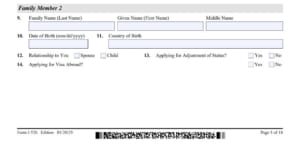Many persons who are lawfully present in the U.S. in valid nonimmigrant visa status are eligible to file a Form I-485, Application to Register Permanent Residence or Adjust Status (“I-485 Application”) and “adjust” their status from nonimmigrant status to lawful permanent resident status if they qualify for an immigrant visa classification. For example, nonimmigrants in the U.S. as F-1 students or H-1B temporary workers can file to adjust their status if they are the beneficiary of an approved immigrant petition like an I-130, I-140 or I-526.
Upon filing their I-485 Application and receiving an Employment Authorization Document (“EAD”) card, that person may be considered to be in pending I-485 status and can seek any employment or education opportunities outside of those restricted by their nonimmigrant status. If that person uses the EAD, he or she will lose the previously valid nonimmigrant status (e.g. F-1 or H-1B).
If the I-485 Application is approved, the person will be granted lawful permanent resident status and receive their “green card” identification. However, if the person’s I-485 Application is for some reason denied, then he or she will no longer have the previously valid nonimmigrant status and will most likely have to leave the United States. That person will also begin to accrue unlawful presence in the United States. An accumulation of more than 180 days of unlawful presence can result in a 3 year bar of readmission into the United States.
While most I-485 Applications should be approved, a person should consider carefully whether to remain in their preexisting valid nonimmigrant status or use the flexibility of the EAD card to expand their options while waiting for the adjustment of status to be approved. For example, an H-1B worker may consider staying with their sponsoring employer and continuing to work under the H-1B status, or a F-1 student who may have several years of degree program remaining should consider no change to his or her status while completing the university degree.
If you have questions about adjustment of status or using the EAD card, contact us at info@enterlinepartners.com and speak with a U.S. immigration attorney in Ho Chi Minh City, Manila and Taipei.
ENTERLINE & PARTNERS CONSULTING
Ho Chi Minh City, Vietnam Office
Suite 601, 6th Floor, Saigon Tower
29 Le Duan Street
Ben Nghe Ward, District 1
Ho Chi Minh City, Vietnam
Tel: +84 933 301 488
Email: info@enterlinepartners.com
Facebook: Enterline & Partners – Dịch vụ Thị thực và Định cư Hoa Kỳ
Website: http://enterlinepartners.com
Manila, Philippines Office
Tel: +63 917 543 7926
Email: info@enterlinepartners.com
Facebook: Enterline and Partners Philippines
Website: https://enterlinepartners.com/language/en/welcome/
Copyright 2022. This article is for information purposes only and does not constitute legal advice. This article may be changed with or without notice. The opinions expressed in this article are those of Enterline and Partners only.




